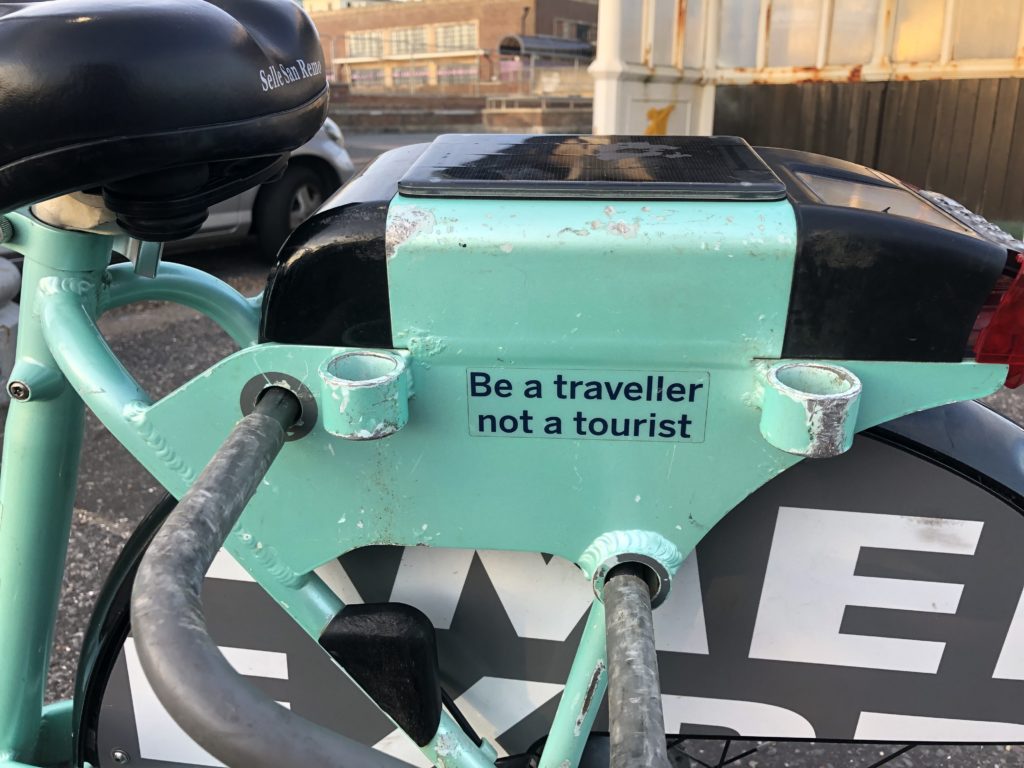
In the late 90s, Diesel ran an ad campaign promoting tourism. It was the age of cultural missions in advertising, and the fashion brand encouraged you to “Be a touristâ€. Diesel’s target audience were taking gap years and backpacking in the Far East with a dog eared copy of Alex Garland’s 1996 novel The Beach. They were self-avowed travellers not just sight seers. But hey, the ads were too funny.
20 years later, we are still falling over ourselves to eschew tourism. But why? For my PhD I’ve been reading a bit about tourism and discovered the theory that tourism is the quintessential human condition, for post-industrial westerners. Dean MacCannell, who founded the discipline of tourism studies, has argued that we assert our modernity by gazing on evidence of the past. We do this because we cannot allow ourselves to identify with our oft tyrannical ancestors.
Ironically, travel (not tourism) is one aspect of our premodern past. Tourism evolved from travel, and not vice versa. With roots in the 16th century notion one could complete one’s classical education with a Grand Tour of classical Europe. The world’s first travel package, from Thomas Cook as it happens, was a chartered train to a rally in support of temperance. Why would you want to go back to either of those travel propositions.
So I was stopped in my tracks, in my hometown, on the beach, where I was neither tourist nor traveller by the exhortation on the side of BTN Bike Share hire bikes. You can read it in the photograph above. Unlike the most iconic Diesel campaigns from the nineties, it was not clear to me who was being addressed here. Surely no one living in Brighton. Day trippers are most likely, but it’s incredibly pretentious to consider yourself a traveller in a town set up to cater for hedonistic Londoners.
Of course, Brighton does have its fair share of travellers. But most of those are parked up on the edge of Preston Park in converted horse trucks. I’m not sure they’re the corporate, app-driven, bike hire types.
1 Comment
Mark, I thoroughly enjoyed this one. I thought it would make a great article to use with some of my students of English at a more advanced level.
For what it is worth, I have thought about this a lot in regard to my relocating to Italy– sometimes I feel like a traveller, at other times a tourist. Like you, I don’t think there is anything wrong with being a tourist per se. I think, though, the word has connotations of a certain kind of person who likes to “play safe”, with a guide, itinerary, and the company of a large group of fellow countrymen/women they can surround themselves with, keeping the sense of encountering something foreign at a distance.
You led me to pick up my copy of Hemingway’s “The Sun Also Rises”, to a passage I always remembered (I know this novel quite well), where Jake and his friend Bill are on a train heading towards Pamplona. They encounter an affable American family, and Bill complains in conversation about the “Pilgrim Fathers”, a large group of American Catholics (presumably they are Catholics) on a pilgrimage to Rome, then Biarritz and Lourdes (“They’ve got seven cars of them from Dayton, Ohio”) who have “cornered the dining car” till late in the afternoon, making it difficult for anyone else to get something for breakfast or lunch.
The implication is that Jake and Bill –like Hemingway– are “travellers”, they learn some of the local language (or speak it well), engage with the locals and their customs, and can find the more interesting and authentic places wherever they are (this is Chapter 9 if you’re interested in looking it up).
Yet not everybody has the opportunity to live in a foreign country long enough to be more than a tourist, and it seems unfair to tar all tourists with the same brush… many tourists arrive in a place with an open mind and an open heart, and there is something beautiful and touching about such tourists, trying to gulp down as many sunsets, places of natural beauty, exotic food and frozen Margaritas as they can in short time before returning to the everyday life that waits for them back home. To sum up, really enjoyable article, thanks for posting it.